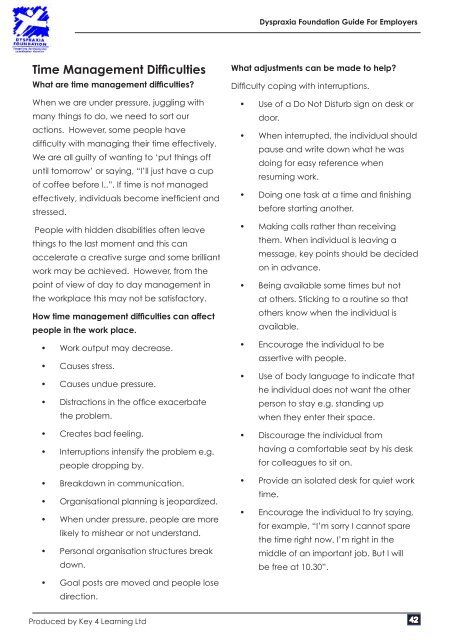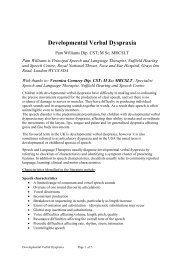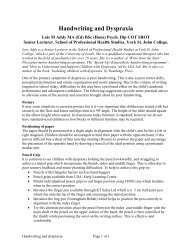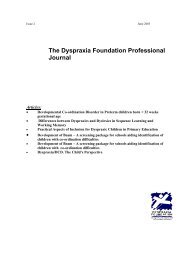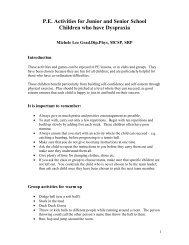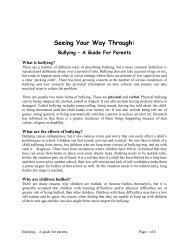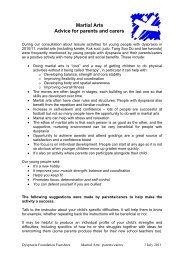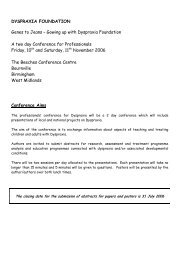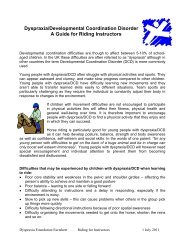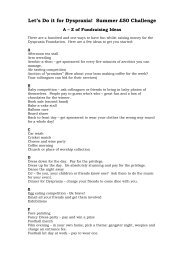Employers Guide - Dyspraxia Foundation
Employers Guide - Dyspraxia Foundation
Employers Guide - Dyspraxia Foundation
Create successful ePaper yourself
Turn your PDF publications into a flip-book with our unique Google optimized e-Paper software.
<strong>Dyspraxia</strong> <strong>Foundation</strong> <strong>Guide</strong> For <strong>Employers</strong><br />
Time Management Difficulties<br />
What are time management difficulties?<br />
When we are under pressure, juggling with<br />
many things to do, we need to sort our<br />
actions. However, some people have<br />
difficulty with managing their time effectively.<br />
We are all guilty of wanting to ‘put things off<br />
until tomorrow’ or saying, “I’ll just have a cup<br />
of coffee before I..”. If time is not managed<br />
effectively, individuals become inefficient and<br />
stressed.<br />
People with hidden disabilities often leave<br />
things to the last moment and this can<br />
accelerate a creative surge and some brilliant<br />
work may be achieved. However, from the<br />
point of view of day to day management in<br />
the workplace this may not be satisfactory.<br />
How time management difficulties can affect<br />
people in the work place.<br />
• Work output may decrease.<br />
• Causes stress.<br />
• Causes undue pressure.<br />
• Distractions in the office exacerbate<br />
the problem.<br />
• Creates bad feeling.<br />
• Interruptions intensify the problem e.g.<br />
people dropping by.<br />
• Breakdown in communication.<br />
• Organisational planning is jeopardized.<br />
• When under pressure, people are more<br />
likely to mishear or not understand.<br />
• Personal organisation structures break<br />
down.<br />
What adjustments can be made to help?<br />
Difficulty coping with interruptions.<br />
• Use of a Do Not Disturb sign on desk or<br />
door.<br />
• When interrupted, the individual should<br />
pause and write down what he was<br />
doing for easy reference when<br />
resuming work.<br />
• Doing one task at a time and finishing<br />
before starting another.<br />
• Making calls rather than receiving<br />
them. When individual is leaving a<br />
message, key points should be decided<br />
on in advance.<br />
• Being available some times but not<br />
at others. Sticking to a routine so that<br />
others know when the individual is<br />
available.<br />
• Encourage the individual to be<br />
assertive with people.<br />
• Use of body language to indicate that<br />
he individual does not want the other<br />
person to stay e.g. standing up<br />
when they enter their space.<br />
• Discourage the individual from<br />
having a comfortable seat by his desk<br />
for colleagues to sit on.<br />
• Provide an isolated desk for quiet work<br />
time.<br />
• Encourage the individual to try saying,<br />
for example, “I’m sorry I cannot spare<br />
the time right now. I’m right in the<br />
middle of an important job. But I will<br />
be free at 10.30”.<br />
• Goal posts are moved and people lose<br />
direction.<br />
Produced by Key 4 Learning Ltd


